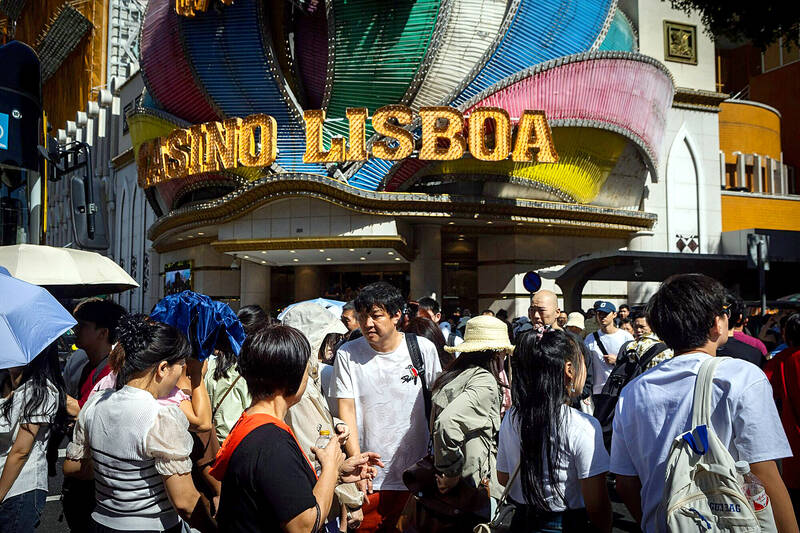Macau’s gaming revenue fell 2 percent last month, missing analysts’ expectations as scrutiny over gambling activities tightened during Chinese President Xi Jinping’s (習近平) visit to the world’s biggest casino hub.
Gross gaming revenue reached 18.2 billion Macau patacas (US$2.3 billion) for the month, according to data released by the Macau Gaming Inspection and Coordination Bureau yesterday. That compared with the median analyst estimate of a 2 percent year-on-year increase and is still 20 percent lower than the pre-COVID-19 pandemic level in 2019.
Last month’s figures bring the territory’s total gaming revenue for last year to 226.8 billion patacas, up 24 percent from the year before and returning to 78 percent of the 2019 level.

Photo: Bloomberg
Xi’s three-day visit to Macau — his first since 2019 — that ended on Dec. 20 means security checks tightened significantly during the time, denting sentiment among frequent gamblers and big spenders from China, which is the biggest source of the territory’s tourism spending.
In a speech during his visit, Xi urged Macau to continue its economic diversification, boosting policy support and investment to cultivate new industries with international competitiveness.
The Chinese leader spoke after swearing in Sam Hou-fai (岑浩輝) as the chief executive of the territory on the 25th anniversary of its return to Chinese rule.
China’s crackdown on high rollers to curb capital outflow has accelerated the decline of Macau’s VIP gambling sector, which before the pandemic contributed about half of the territory’s gaming income. As a result, casinos are rolling out more conferences and entertainment events to attract mass-market tourists to make up for the loss.
Analysts expect gaming revenue to return to 82 percent of the pre-pandemic level this year, with income from the mass-market sector growing to 118 percent of the 2019 level, while the VIP sector might still be down 60 percent.

Taiwan Semiconductor Manufacturing Co (TSMC, 台積電) yesterday said that its investment plan in Arizona is going according to schedule, following a local media report claiming that the company is planning to break ground on its third wafer fab in the US in June. In a statement, TSMC said it does not comment on market speculation, but that its investments in Arizona are proceeding well. TSMC is investing more than US$65 billion in Arizona to build three advanced wafer fabs. The first one has started production using the 4-nanometer (nm) process, while the second one would start mass production using the

When an apartment comes up for rent in Germany’s big cities, hundreds of prospective tenants often queue down the street to view it, but the acute shortage of affordable housing is getting scant attention ahead of today’s snap general election. “Housing is one of the main problems for people, but nobody talks about it, nobody takes it seriously,” said Andreas Ibel, president of Build Europe, an association representing housing developers. Migration and the sluggish economy top the list of voters’ concerns, but analysts say housing policy fails to break through as returns on investment take time to register, making the

‘SILVER LINING’: Although the news caused TSMC to fall on the local market, an analyst said that as tariffs are not set to go into effect until April, there is still time for negotiations US President Donald Trump on Tuesday said that he would likely impose tariffs on semiconductor, automobile and pharmaceutical imports of about 25 percent, with an announcement coming as soon as April 2 in a move that would represent a dramatic widening of the US leader’s trade war. “I probably will tell you that on April 2, but it’ll be in the neighborhood of 25 percent,” Trump told reporters at his Mar-a-Lago club when asked about his plan for auto tariffs. Asked about similar levies on pharmaceutical drugs and semiconductors, the president said that “it’ll be 25 percent and higher, and it’ll

CHIP BOOM: Revenue for the semiconductor industry is set to reach US$1 trillion by 2032, opening up opportunities for the chip pacakging and testing company, it said ASE Technology Holding Co (日月光投控), the world’s largest provider of outsourced semiconductor assembly and test (OSAT) services, yesterday launched a new advanced manufacturing facility in Penang, Malaysia, aiming to meet growing demand for emerging technologies such as generative artificial intelligence (AI) applications. The US$300 million facility is a critical step in expanding ASE’s global footprint, offering an alternative for customers from the US, Europe, Japan, South Korea and China to assemble and test chips outside of Taiwan amid efforts to diversify supply chains. The plant, the company’s fifth in Malaysia, is part of a strategic expansion plan that would more than triple